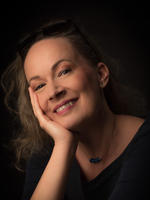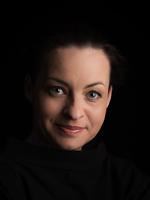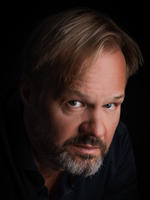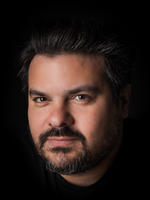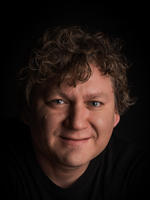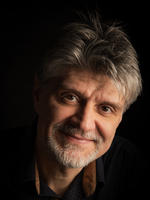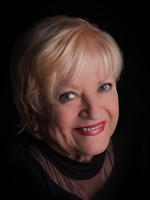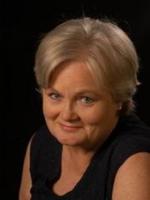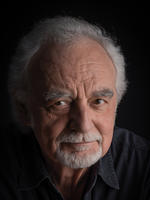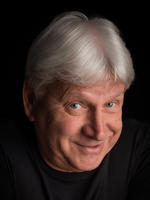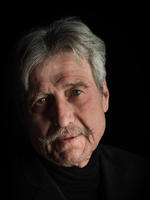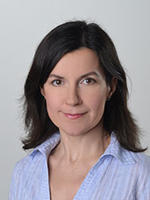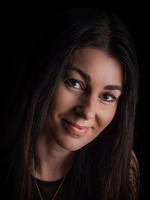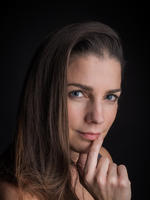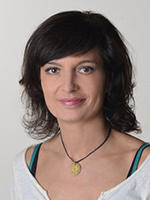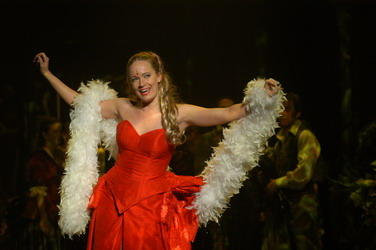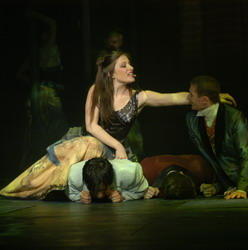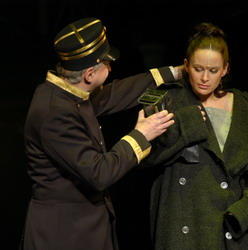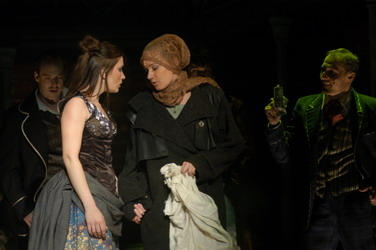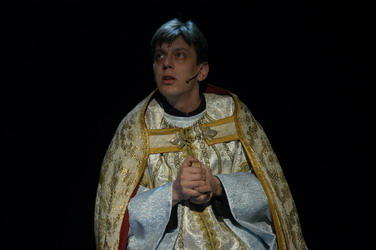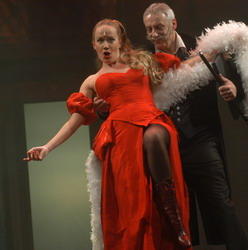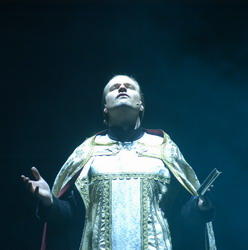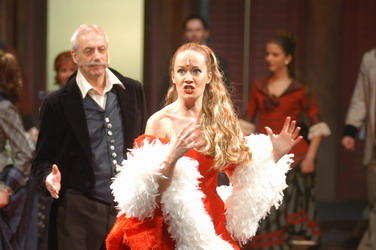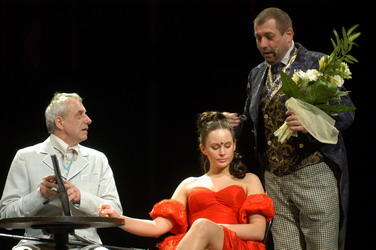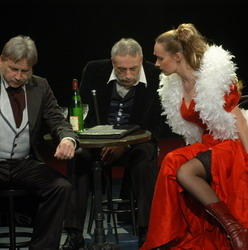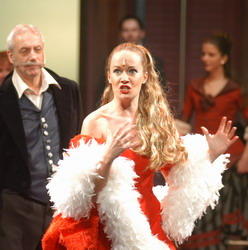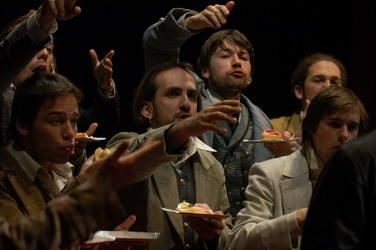Musical Nana Hurts and Suffers
Vít Závodský 16. May 2005 zdroj Týdeník rozhlas
Uhde’s sophisticated libretto, exceeding an ordinary average of domestic musical production, does not want to judge or moralize with a distance; it rather creates the feeling of relativized values, characteristic for the contemporary globalized world, it tries to have an ambivalent approach to themes, figures and situations, it is not afraid of oscillating between sentimentality and ironical or spoof view from above. The same reach is evident in the score of the experienced musicologist and conductor of an eighteen-member live orchestra Karel Cón; he gives up hits and composes a colourful, historically informed mosaic of different styles, paraphrases (Evita), citations and illusions - from baroque, through Offenbachian operetta, to jazz and rock. Prague director Petr Kracik (guest) could use not only the kinetics of the vertically oriented scene designed by Jaroslav Milfajt (guest) which resembles a balcony house, but also artful particularities of the script, e.g. the principle of a theatre in the theatre (period mythological féerie of the Paradis ensemble and the subsequent play about Joan of Arc), antiillusive alienating entrance of figures, simultaneity, spatial penetration, final “resurrection” of the heroine etc.
The heroine, no matter if represented by more graceful Alena Antalová or Jitka Čvančarová more convincing in her peripheral vulgarity, may confuse the audience with her non-explicitness – contrast between the momentary goodness of her heart, the bestiality of the “putrid monster” and the suffering from diphtheric agony which seems to be her punishment for heartlessness to her own child and for destroyed existences of her rich lovers acted by Ladislav Kolář (Count de Beauville), Karel Janský (banker Steiner) and others. Fortunately, the bearing idea was to make Nana’s continual opponent from the episodic novel figure of abbé Vénot (finally, the artful plotter, conscious of his own guilt, gives absolution to the hated dying courtesan): Jan Apolenář’s impressive performance raises abbé Vénot up to the protagonist of the story.
Nana – a Drug with Destructive Effects
Radmila Hrdinová 3. May 2005 zdroj Právo
The authors of the new musical looked at the famous Parisian courtesan through the optics of the present-day, more cynical world.
A musical is based, in contrast to rock/pop operas, on a balanced relation among music, word and dramatic action. Intrinsic dramatist Uhde created sagaciously Nana’s adversary, fanatic abbé Vénot for whom his relation to Nana is a source of internal torturous dilemma. Nana is not a black-and-white figure, she has a space enough for female pragmatism, non-female cynicism and emotional insecurity. Uhde’s live and tasteful script makes a basis for a colourful period fresco as well as a contemporary view of boulevard, fanaticism and theatre relations seen with exaggeration.
Director Petr Kracik avoided cleverly obscenity the story might tempt to and attracted audiences without pandering. Imaginative and rich music by Miloš Štědroň, who is number one among composers with the sense of theatre, also contributed to Nana’s success. In Nana, he accumulates catching hits, engaging melodies, brisk dancing numbers and quasihistorical playful parodies, without losing his authorial manuscript in this varicoloured mixture.
Alena Antalová (alternated by Jitka Čvančarová) looks attractive in the title role, but rather cool. Her Nana rather approaches disgusting calculation than a tragic fate you can symphatize with. But she also avoids sentiment to which Nana’s fate could lead her to, although Uhde wrote an insurance to her in the final theatrically abstracting rebirth. Jan Apolenář makes a suggestive dramatic and singing figure of abbé Vénot, Karel Janský masters Steiner’s transformation from a rich patron into a human ruin, Igor Ondříček acting the Count Muffat is perhaps a measured aristocrat for too long before he reveals his uncontrolled feeling, dramatist and critic Fauchery played by Karel Mišurec is a comic element which cannot be ignored. The Brno Nana has all preconditions to become a successful title on other domestic dramatic scenes. They will not do wrong.
Innocent, Damned, Unknown
Ivan Žáček 19. April 2005 zdroj Divadelní noviny
The ninth premiere performed by the Brno City Theatre this season was a musical version of the great novel story of Parisian prostitute Nana by Emil Zola. The new Music Scene, which opening was celebrated by the premiere of Forman’s musical Hair in October 2004, was mainly designed for musicals and concerts. Undoubtedly, drama would be successful there too as, from the first sight, the space is favourable to a dramatic action and looks very cultivated. The performance of Nana is also cultivated and balanced. The author of libretto Milan Uhde was freely inspired with the novel story, strengthening its general features as if he felt that Nana is a novel of the 19th century on which we may admire the skilfully elaborated novel structure and literary qualities of the grand master of the French naturalism, but the story itself cannot give such a shocking impression which frightened and provoked Parisian townsmen one hundred and twenty-five years ago.
The discontinuous sequence of individual scenes of Nana’s life “devoted to sin” is built with a great dramaturgical skill and reveals well the author’s view which differs somewhat from Zola’s view. Uhde and Štědroň do not judge so severely and, as it is not possible otherwise at present, they try to make the end of the story relative. Nana is not a symbol of all evil, a sum of world’s depravation. She is not Venus in decay, a monstrous creature depicted with all the energy of naturalistic phraseology, whose face as if were mutilated in her hour of death – in the impressive closing effect, really “enjoyed” by Zola – by all the “poison of Parisian sewers, sucked from the carcasses kicked away, which poisoned the mankind”.
Uhde knows very well that we do not distinguish the good and the evil so accurately as in the century of striking novels. And that the recipe of how to write a figure to be positive or which features and actions endow to it to be repulsive is much less reliable than in the time when Zola’s “great moral indignation” culminated. He knows that today a prostitute can only be a symbol of the evil on the world for the minority of spectators of a certain type. For the others – for whom the musical is written as a majority genre – she is just an ordinary tourist attraction, incommodious for some, welcome to others. The catholic priest, who is her bitter enemy for the whole time, absolves her of sin finally as “she is sorry that she is not sorry for anything she has done“. And as it is a musical, the sinful Nana rises up of her dead body - for Zola it is just “earth’s mould on a deformed mass, a hillock of spoilt meat” – and sings the final song along with the chorus. Who is the musical Nana? “Innocent, damned, described and unknown – this is Nana.” Newspapermen, paparazzi of modern time, who are nine in Uhde’s version, lighten her considerably with tons of dirt.
The music reveals that its author is an experienced composer and musicologist Miloš Štědroň. The music is a quodlibet of styles – from the Renaissance up to jazz or music-hall. You can hear idioms of old dances beside indubitably operetta intonations, musical as if cut-out from Broadway beside a folk song. The composer can play wittily with quotations, as in one organ prelude when a sign of Debussy’s satyric chromatics can be heard. Štědroň himself says that a musical is something like an instant opera where various styles are dissolved, mainly verism, late romanticism and operetta. He is the best in chorus numbers which are grateful and songful. The style ranges from Dvořák to Nedbal, and even to Andrew Lloyd Weber. Štědroň’s score includes a lot of cultivated, intelligent, tasteful, instructed and happily inspired music.
One thing cannot be denied to the Brno musical trends. They try to do a complex theatre which – in contrast to Prague – “plays, dances and sings”. There are specialist for everything in Prague: a star sings and walks its role, while other boys are there to dance. However, this triathlon is a challenging discipline and does not always come out well: dancing of some actors looks convulsive, they just learned mechanic steps and repeat them exactly, for example in the second strophe. Alena Antalová creates her Nana with quite inconspicuous, agreeable dramatic means, but her singing is almost like that of the novel Nana. The latter also gained audiences like Venus rather with her attractive look than singing. With her first tones the question comes up if the director Petr Kracik exaggerated a bit the naturalistic concept of the main part. Zdeněk Junák, sketching roughly its portrait of Bordenavo, distinctive boss of the Paradis Theatre, distinguished himself from the pleiad of actors.
Brno Is Better!
Martin Porubjak 6. April 2005 zdroj SME
Last Saturday, on 2nd April, the premiere of Nana, musical written by Milan Uhde and Miloš Štědroň according to the famous novel by Emil Zola, was held in Brno. This time not at the Goose on a String Theatre, but on the special scene of the Brno City Theatre. That is, in the most modern and best equipped theatre in the Czech Republic, built in a year and a half (please, compare with nineteen years of building of the still unfinished Slovak National Theatre).
“Vice and virtue are products like vitriol and sugar,” Zola says, acknowledging the social and heredity determinism of naturalists. And so his Nana is a fruit of the environment where moral principles are absent. More such legendary heroes and heroines appeared at the turn of the 19th and 20th century (besides Zola’ Nana from 1880, it was also Wedekind’s Lulu in 1894 and Brecht’s Baal in 1918). They are still exciting and extremely up-to-date works and the present theatre comes back to them regularly. Uhde and Štědroň had a lucky hand and another original Czech - sorry: Moravian! – musical with thirty music numbers, seventy performers and a fifteen-member live orchestra arose! Something unprecedented in Slovakia.
Nana - Review
David Kroča 1. December -1 zdroj ČRo3 - Vltava
The majority of roles is alternated, so the resulting impression of a particular performance depends on the actors you can just see. If you are lucky to meet Nana acted by Jitka Čvančarová, you will get to know a charming lady whose attractive appearance is in a sharp contrast to her behaviour. In spite of that, Čvančarová is the most convincing at the moments when her heroine seduces chosen men, but she has certain reserves as mother longing for seeing her son or a harpy punishing her maid. While Jan Apolenář playing the part of count’s confessor attracts at least with the impressive singing of his solo, Ján Jackuliak acting the part of animalistic Mimi has such problems with pronunciation that his figure looks like a caricature of its own. From the performance I have seen, I can also recommend the brilliant Ladislav Kolář acting the part of an enamoured count. Kolář sings very well and, moreover, he gave an exact dramatic interpretation to his figure: he is a man dragged with his desires he is unable to resist and he even does not realize it.
Alena Antalová as Nana
1. December -1 zdroj Kult
Nana – original musical by Miloš Štědroň and Milan Uhde has been performed on the Music Scene of the Brno City Theatre since April. Uhde’s Nana, inspired by the homonymous novel written by Emil Zola, is a story of a girl climbing across rich and respectable men up to the very top of society. Director Petr Kracik leads actors to maximum performances, he uses and unites perfectly all components of musical theatre. Štědroň’s music is a mix inspired with and coming from music motives and melodies from the seventeenth century until present time. It underlines, enhances and tinges the dramatic story. Nana is acted with perfect dramatic, singing and dancing virtuosity by Alena Antalová who plays credibly all nuances of an attractive young girl-whore-lady in one person, has a sensitive and responsive heart, lacks moral, but is alluring due to her exceptionality and femaleness. You will also be attracted by Zdeněk Junák, Karel Janský, Karel Mišurec, Jan Apolenář, Igor Ondříček, Petr Štěpán... David Strnad managed to create a very “live” choreography. Music was rehearsed by Karel Cón, the stage was designed by Jaroslav Milfajt, the coloured costumes representing the time and positions of persons were designed by Tomáš Kypta. Nana has a story, a charge as well as an idea. Undoubtedly, it will rank as one of the best thrillers of the season thanks to its excellent presentation and cast.
Invitation to a Theatre - Nana
Jaroslav Parma 1. December -1 zdroj Zpravodaj Blansko
Milan Uhde (author of the text) and Miloš Štědroň (author of music) met for the third time to cooperate. However, it is funny that it was for the first time when they really cooperated as in the previous two cases (The Ballad for a Bandit and the May Fairy-Tale) the musician did not know the real author of the script. In that time, Milan Uhde was prohibited from writing and wrote under the name of another author. For his new drama Milan Uhde chose motives of Emile Zola’s novel “Nana” which was a scandal in Zola’s time. Uhde had been playing with the theme since the beginning of the 1970’s. He wrote the play right for the Brno City Theatre as the theatre director Stanislav Moša invited him to do so. Then Milan Uhde himself asked Petr Kracik to direct the play. The orchestra is conducted by Karel Cón.
“Nana”, although it would tempt to, is not a play with lecherous scenes, but it is about looking for the sense of life, about feelings, love, sympathy and forgiveness. In spite of the milieu where the action takes place, the performance is pure in fact. Though the protagonist of the play is prostitute Nana (the second premiere on 03/04 was acted brilliantly by Jitka Čvančarová), Abbé is, in contrast to the novel, her opponent (excellent Petr Gazdík). The other roles are cast excellently too (Milan Horský, Irena Konvalinová, Johana Gazdíková, Ladislav Kolář, Zdeněk Brureš, Zdena Herfortová, Jan Mazák and others). The music, as it was confirmed by Miloš Štědroň, does not play at Paris, it is intentionally disparate, does not avoid operetta, songs and other genres, as the action requires. The original musical “Nana” will certainly be performed on the new scene of the Brno Music Theatre for a long time.
Nana the Woman
Martin Flašar 1. December -1 zdroj Opus musicum
The story of Nana is a great social topic taking place in the space of the individual fate of a lonely and abused child.
The music by Miloš Štědroň underlines brilliantly the course of action. It does not disturb where it is not to be perceived and contributes perfectly to the required atmosphere. However, where it is to be heard – to be said laconically – the composer proves that in contrast to his less talented colleagues he is able to create an original melody which is not worn out at the moment you can hear it for the first time. The music of this musical reveals the author’s deep erudition and detailed knowledge of music of past centuries. The ease of his moving among historical styles is admirable, but he does not lose a critical view. He can confront an organ fantasia with a rock song, a Renaissance madrigal with a dixieland. I think that especially the “lesbian duet” of Sali and Nana in the third act, for which the author borrowed the scene looking like cut out of a TV brass band hit parade, is very successful. Another music asset of the musical is the “vulgar pub valse” really mastered by Miloš Štědroň.
The scenario was written by Milan Uhde in the 1970’s for the Theatre on a String but due to the former political situation it had to wait until now to see its execution. The musical Nana looks like most responsible processing of the socially critical matter reflecting the moral atmosphere in the society living in a big city in the second half of the nineteenth century, with frequent borrowings of Brechtian dramatic approaches (e.g. alienating entries of journalist and dramatist Clément Faucherry or glossing songs and occasional choirs from journalists’ mouths). For the above reasons, and many others, the musical Nana highly exceeds the current, mostly funfair musical production.



